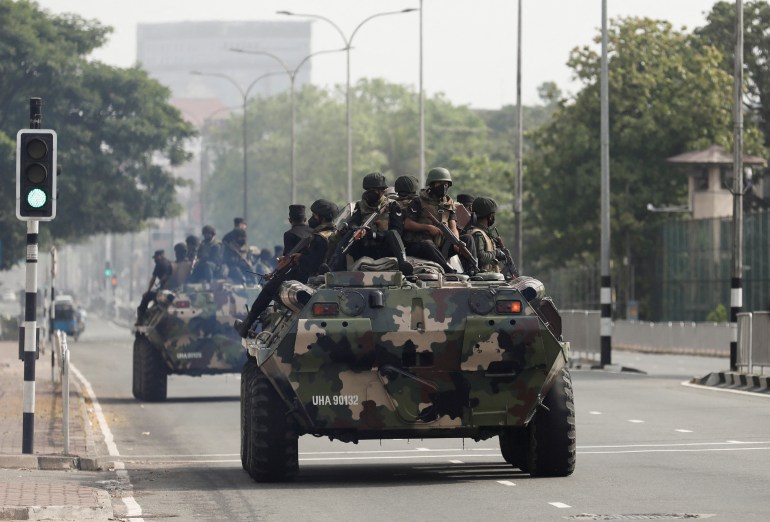A Brief Colonial History Of Ceylon(SriLanka)
Sri Lanka: One Island Two Nations
A Brief Colonial History Of Ceylon(SriLanka)
Sri Lanka: One Island Two Nations
(Full Story)
Search This Blog
Back to 500BC.
==========================
Thiranjala Weerasinghe sj.- One Island Two Nations
?????????????????????????????????????????????????Saturday, June 11, 2022
Sri Lanka’s economic crisis threatens its dollar-earning IT firms
Sri Lanka’s IT sector is trying to retain talent with dollar-linked salaries as young professionals look to exodus.

Apart from a leading revenue earner, Sri Lanka's IT sector was one of the first to publicly support the wave of protests held against the Rajapaksa government [File: Dinuka Liyanawatte/Reuters]
Colombo, Sri Lanka–There have been days when cybersecurity professional Asela Waidyalankara and his colleagues have sat in hotel lobbies to complete projects during power outages. Other days, they have run around Colombo looking for fuel for generators so they could work from home.
“We have a buddy system at the company to inform each other about fuel availability,” laughs Waidyalankara, adding that his company encourages staff to carpool if they have to attend meetings in Colombo and work from home when possible.
Before the pandemic, Sri Lanka’s IT industry employed more than 120,000 people and was the fifth-largest export earner for the island nation of 22 million. It was on track to become the top exporter within the next five years and double its employees. But with the government of President Gotabaya Rajapaksa having defaulted on its foreign debt earlier this year and critical shortages crippling the economy, those plans are now in jeopardy as it becomes harder to maintain normal business operations.
Daily, hours-long power cuts are now normal. Fuel queues stretch for kilometres, sometimes so far that one fuel queue meets another. The country is running on a cash flow basis. “We are using whatever dollars that flow in to purchase the essentials we can,” Nandalal Weerasinghe, governor of the Central Bank of Sri Lanka (CBSL), said last month.
On May 19, the CBSL said it expects the economy to “record a setback” even as the cost of living continues to shoot up – May inflation was 39.1 percent, and fuel prices have more than doubled since the start of the year.
Steady power and smooth internet, essential for the IT industry to function effectively, are constantly affected. “We have weekly and monthly deliverables and we struggle to meet them sometimes,” Waidyalankara told Al Jazeera. “Our service levels are also affected, for example, we have to reply to a cybersecurity incident within two hours, but with power cuts and slow internet it is a challenge to meet these expectations,” he said.
Sri Lanka has several regional competitors in the IT sector, including India, Bangladesh and Vietnam. “We have spent years cultivating relationships with clients, so they are understanding, but there is always a fear that our business will be taken away and given to competitors if we cannot maintain our delivery and quality,” says Waidyalankara.
The ongoing economic crisis and the lack of a cohesive plan by the incumbent government to resolve it are starting to affect the confidence of foreign investors.
Sanjiva Weerawarana, founder and chief executive of WSO2, a Sri Lankan software company which raised $90m from Goldman Sachs in November, told Al Jazeera that his company has had to look for creative ways to hedge the country’s risk to appease investors. While WSO2 has offices in several countries, including the United States, the United Kingdom, Dubai and India, the company will “likely expand” its presence outside Sri Lanka to boost investor confidence and ensure business continuity, Weerawarana said.
Some companies have even set up temporary offices in neighbouring countries like India and Dubai and relocated some of their staff to these offices to maintain business continuity. “We are not going to relocate the company, but we temporarily relocated a few staff members to a Dubai office in April just to ensure business runs smoothly,” said Weerawarana.

Brain drain
The past few years in Sri Lanka have been troublesome. An unconstitutional 52-day government in October 2018 shook investor confidence and was followed a few months later by deadly bomb blasts on Easter Sunday in April 2019. And while migration, especially among highly skilled workers like software engineers, doctors and nurses is not uncommon, the economic conditions of the past year, on top of the turmoil before that, have increased the pace at which Sri Lankans seek greener pastures.
The ongoing economic crisis has made the cost of living exorbitant, especially as the value of the US dollar has appreciated by 75 percent against the Sri Lankan rupee in the past year. Owning a car or a house is a pipe dream and with their hopes crumbling around them, many young Sri Lankans are looking to migrate and get away from an uncertain future in their birth country.
A November 2021 survey report (PDF) by the Colombo-based Institute for Health Policy, an independent research centre, found that the number of Sri Lankans who want to migrate had doubled from three to five years ago and nearly 50 percent of the young and educated wanted to migrate now. Long queues at the passport office are just one indication of this.
A 35-year old software engineer who preferred not to be named moved to Australia with his family in March this year. “I didn’t really have any plans to migrate. I ran a small IT company, and I was happy with it,” he said. But a rise in ethnic and racial tensions in the country before the 2019 elections made him think about relocating and the subsequent economic mismanagement sealed his decision. “It’s really not promising in Sri Lanka. I want to prioritize my daughter’s future,” he said.
If Sri Lankan software companies can power some of the world’s largest stock markets like the London Stock Exchange and Borsa Italiana, and some of the world’s busiest airlines like Qantas, it is because of local talent. A brain drain would spell disaster for the sector.
“It’s our people who have helped us build world-class companies,” says Waidyalankara. “The real competitive edge for our industry comes from people, and unfortunately they are now beginning to move out of the country. It is a big loss.”
Weerawarana agrees. “We believe that 10 percent of our technically skilled and experienced staff have already applied for migration and another 20-40 percent are probably considering it,” he said.
The industry has also been important in other ways – it was one of the first to publicly support the wave of spontaneous protests held across Sri Lanka in March and April this year against the Rajapaksa government. Industry personnel even organized a rally to mark 50 days of protests since locals set up the ‘GotaGoGama’ site at the capital’s Galle Face Green promenade.

Pegged salaries
With its high salaries and flexible working environment, Sri Lanka’s IT industry has always had a better draw of talent than other important sectors like banking and tourism. To retain that talent now, industry players have had to devise newer ways.
Since the Sri Lankan rupee began plummeting, several IT companies which earn in foreign currencies have begun pegging the salaries of their local staff to either the US dollar, the pound sterling, the euro or the Australian dollar – making the industry an attractive employer for many locals.
This has had an unexpected effect on the smaller IT firms which cater to local clients and lack a large pipeline of foreign contracts and currencies. Unlike the larger companies, they are not able to peg the salaries of their staff to a foreign currency.
“Some of the key staff are considering migration or are moving into the larger companies who pay dollar-pegged salaries,” Deane Jayamanne, an owner of a small software company, told Al Jazeera. “On top of power cuts and internet problems, we also have to deal with this now,” he added.
The software engineer who migrated to Australia said that he did not think the IT industry in Sri Lanka had proper talent acquisition and retention policies. “When I applied for jobs to migrate [a year ago], I got two offers from Australia and the Netherlands. They took care of everything. The visa, air tickets, relocation expenses and even temporary housing. All I had to do was show up at the airport. That is how far they go to acquire talent.”
Where to from here?
Despite ambitious plans last year by Sri Lanka’s apex body for investment promotion in the country, the Board of Investment, to push the IT industry as a top earner and employer for the nation, the reality seems to be heading another way.
The situation is aggravated because there was already an existing supply gap in the industry. The Information and Communication Technology Agency, the government body responsible for ICT policy in the country, warned in a 2019 report that “the demand-supply gap for ICT workers is widening rather than closing”.
Even with dollar-pegged salaries and flexible work environments, a quick resolution to the ongoing economic crisis is what is needed to retain talent, employers say. It is also the key to ensuring a steady pipeline of foreign investors and clients. “Once we have charted a course for the country, I believe investor trouble will go down significantly,” said Weerawarana.
Experts worry that without that solution, the country “risks undermining its future growth”. Economist Malathy Knight, in an interview with Al Jazeera, pointed to Lebanon, which saw a significant exodus of local talent in the face of its own economic and political crisis. “Sri Lanka should learn from the experiences of other countries,” she said.
“It is vital to provide hope and opportunities to the youth”, Knight said, “without such efforts, Sri Lanka will continue to spiral downward economically and socially even after the economic crisis stabilizes.”

%20(2)%20(1)%20(1)%20(1).png)